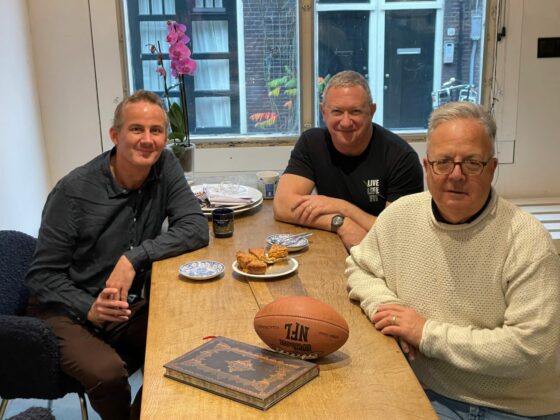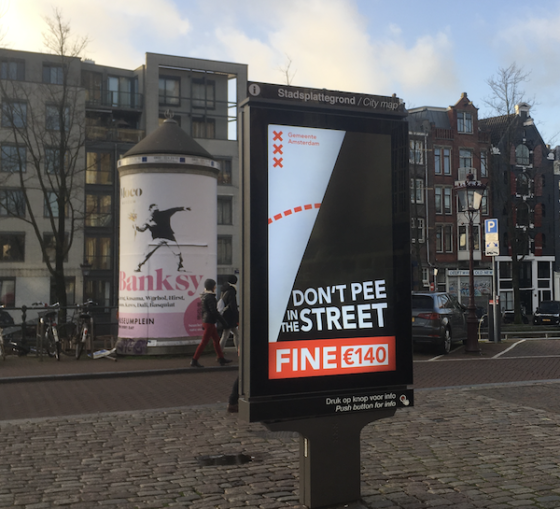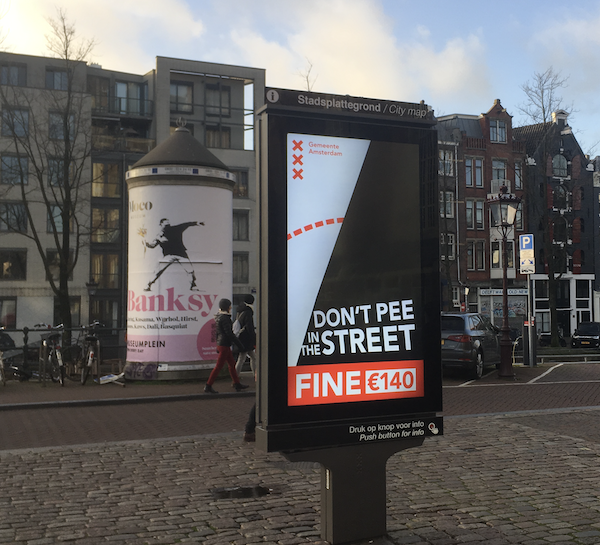What does a quality tourist look like? Hotels and B&Bs might know


Stephen and Steve Chicurel-Stein are on a birthday trip to Europe: six nights in Amsterdam, nine in Vienna, with a programme full of ballet, opera, culture, but most of all absorbing city life.
For this couple, who are staying in a traditional bed and breakfast – alongside the owners and their three children – a trip to the Dutch capital is not a chance for a blowout weekend. It’s about opening their eyes.
‘Bikes are for people who want to risk their lives!’ jokes Stephen, a licensed realtor who lives with his husband in Florida. ‘I can’t look if I’m riding a bike – and when I’m here, I want to look at the buildings and the light. It’s very clear in my eyes why we have the Dutch masters: that light hasn’t changed.’
They may well be the kind of ideal tourists that Amsterdam city leaders are thinking of when they talk about campaigns to ensure low-rent guests ‘stay away’. What’s more, Stephen and Steve are staying in a very traditional kind of lodging. It might be rented out via platforms such as Airbnb but Maarten Bruinsma and partner Malo Zacar are running an old-fashioned bed and breakfast, where they get to know their guests and sometimes even become friends.
The side-effect with this kind of tried and tested tourism – a world away from nuisance Airbnb lets in illegal hotels with absent owners – is that the experience could be more positive for everyone.
Bruinsma, chairman of Amsterdam Gastvrij association for bed and breakfast owners, has added his voice to others in the hotel industry in arguing that responsible hospitality businesses play a key role in encouraging positive tourism. It is a message he is taking to Amsterdam council on Wednesday this week, pleading for clemency on huge fines for holiday rental owners who inadvertently broke the rules.
Small scale
‘I remember after high school in 1990 we went through Eastern Europe on Interrail,’ recalls Bruinsma, over coffee in his cosy kitchen with his partner and paying guests. ‘We went through Budapest and there was no structure to accommodate anybody, all these new people who wanted to see these cities. You would come out of the train station to see all these people with a sign saying: room to let.
‘What if there was no internet and this was basically it? It would probably have been so much nicer, because we have a lot of hotels, everything got industrialised. This is what I miss a bit: the small scale.’
In his home and bed and breakfast – a BBB, really, because there are also bikes – there is no room at all for difficult guests. Zacar, an interior designer, loves to share the buzz of people on holiday discovering a new city.
‘I make a big distinction between people who are here like my guests, on a cultural journey, versus an English young person who comes for 24 hours just to get high,’ she says. ‘For me, they should not be coming. But here’s the reality. We have more of those tourists than the lovely people.’
Stephen and Steve are clearly among their ‘lovely people’, eating Dutch apple cake and sharing anecdotes of trips to Ireland, New Zealand, Venice, Barcelona, Vienna and Hamburg – as well as their family history as children of German Jewish Holocaust survivors, one of whom escaped through Amsterdam.

Pee in the mailbox?
Even though a hotelier won’t have the same kind of personal relationship with visitors, chief executive and founder of Conscious Hotels Marco Lemmers believes well-run hotels are a key part of attracting kinder guests.
‘The whole hotel thing has been framed over here as foreign companies getting into the city, robbing the city of the money out there, and it’s all going to foreign bank account,’ he says.
‘But there’s so much hotels do from a cultural point of view, from an inclusion point of view, and an economic one. The hotel business is a very open culture, a lot of work migrants have their first job there in a new city, if you’re a refugee there’s a big chance you’ll end up working in a restaurant or hotel. Yes, there are some hotels that are closed, unconnected, don’t know their neighbours. That’s not the tourism industry I stand for.’
Together with the Volkshotel, Lloyd Hotel and Hotel V, he runs a site pointing out that hotels which have fire safety, noise insulation, a 24 hour reception and anti-vermin policies (of all kinds) are an essential part of forward-looking tourism.
‘I believe in a sort of tourism that has good temporary citizens: people, maybe only for a day or weekend, who are just part of the society,’ he says. ‘Good temporary citizens do not pee through the mailbox. We don’t have stag parties – we’re not doing them. Together, we should change the profile of Amsterdam.’
Tough policy
Last week, inner city chief Sofyan Mbarki announced a set of policy proposals to tackle tourist nuisance, with 18 million visitors expected to overnight in Amsterdam this year. The plans will be developed in coming years but already include earlier closing times for bars, clubs and window prostitution in the red light district, banning smoking cannabis outdoors in tourist hotspots, and potentially forbidding organised pub crawls.
But one element some experts believe needs to be tackled are Dutch tourists, often day visitors from other cities. An extensive ABN Amro briefing by lead author Stef Driessen suggested that raising tourist tax on overnights would have a counterproductive effect – overnight tourists, especially business visitors, are likely to stay outside Amsterdam (and many are already doing this).
This would mean a loss of revenue for the city and would fail to tackle nuisance caused by some 20 million day visitors who come to party and leave rubbish in their wake. In Driessen’s view, banning non-residents from coffee shops – enforcing a national law that already exists – would do more.
‘Crowding is not only hotel guests and Amsterdammers,’ he says. ‘There are technical and legal possibilities for people who come from outside the city to pay as well towards maintaining the canals, to limit the maximum capacity of some areas with turnstiles. Tourists are also prepared to pay for a quieter museum visit, if you have responsive websites or apps. In Venice, this all happened too late, and now it is an open air museum with a few people living there.’
Crossroads
Amsterdam right now is at a crossroads: pre-pandemic levels of tourism have returned. The mayor of Amsterdam Femke Halsema calls it a ‘Januskop’, like the Roman god of transitions Janus, a statue with two heads. ‘It’s the two sides of tolerance, the paradox of tolerance,’ she says.
‘People come to Amsterdam because of the tolerance but an amount of people show behaviour we cannot tolerate. If it we go on like this, I think in 10 or 20 years, people will no longer be living in the inner city of Amsterdam – they will have moved out because they can’t afford it, because the atmosphere is too common, because the city has become too dirty – in all the senses. Too criminal.’
At the same time, though, the city has a €90 million annual hole in its budget from 2026 – a hole that tourism tax, parking fees and other revenues from millions of guests could help fill.
Amsterdam & Partners, the city marketing organisation, will head up a ‘stay away’ campaign in 2023 to encourage nuisance visitors to do just that. Director Geerte Udo wants the guests that do come to support the city’s cultural venues and facilities. She calls this a ‘regenerative’ visitor economy, with interactive apps and social media prompts to suggest places off the beaten track.

Positive
‘We encourage visitors to visit these places that we as locals value,’ she explains. ‘For instance, use public transport, come by train if there is a good connection, go to our theatres and museums, visit the restaurants, bars and shops that we locals love and visit. We [are trying to] seduce people to go off the beaten track by suggesting offers that fit their needs.’
Back in Bruinsma and Zacar’s kitchen, there is a visitor book brimming with complimentary observations, and in pride of place, an American football marked with a child’s name. He was a guest, they say, who spent a week playing with their son. ‘The day he left, the little guy, he said he should probably leave that,’ says Zacar. ‘They gave it to my son.
‘I love the feeling that every time you have guests, I’m not on vacation but they are. It’s such a positive environment…happiness all the time.’
Thank you for donating to DutchNews.nl.
We could not provide the Dutch News service, and keep it free of charge, without the generous support of our readers. Your donations allow us to report on issues you tell us matter, and provide you with a summary of the most important Dutch news each day.
Make a donation